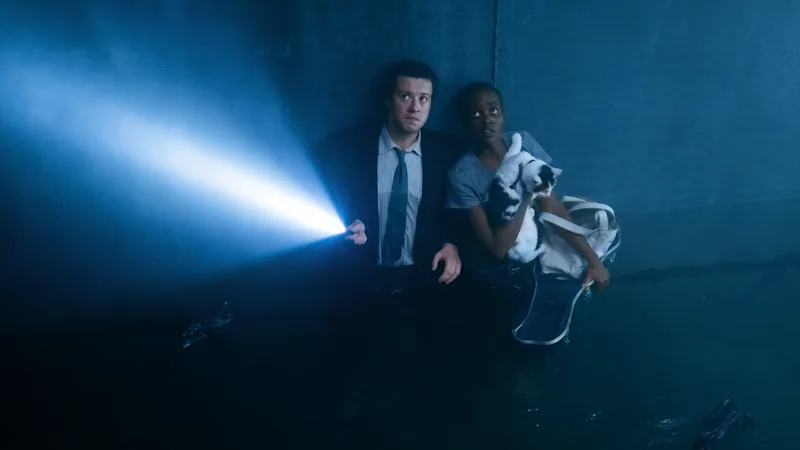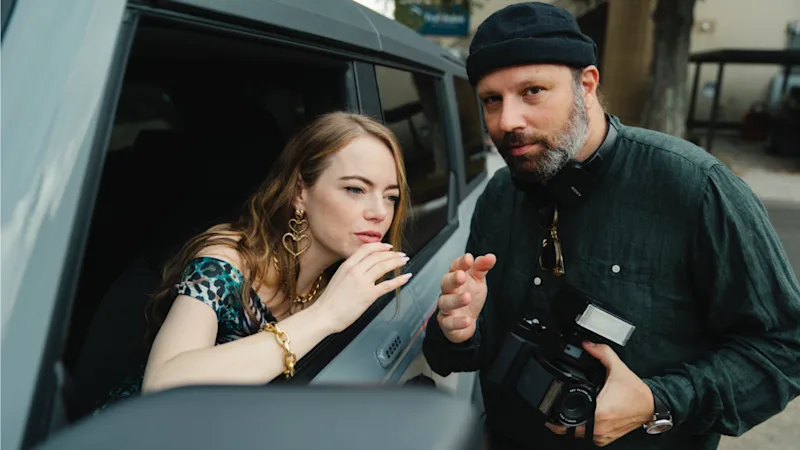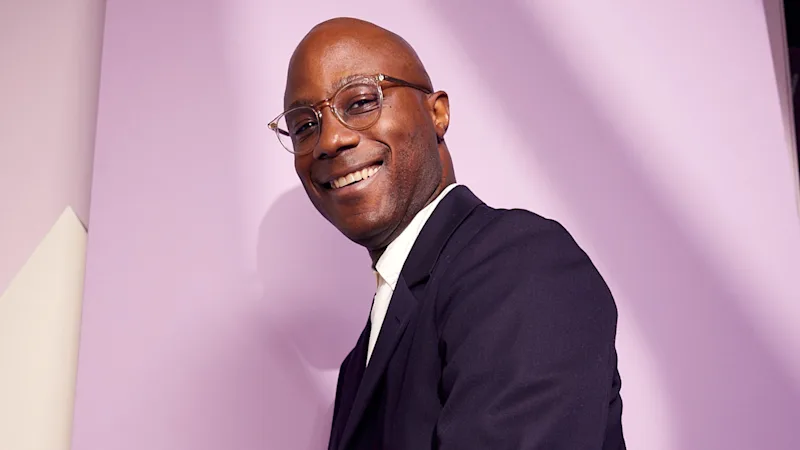In the midst of working on 2016's Rogue One: A Star Wars Story, Gareth Edwards found himself caught up in a terrifyingly surreal situation. "I promised my friend, Matt Allsopp, who was a concept artist on Rogue One, that we would visit Area 51 while we were in America," the British filmmaker recalls. "Right at the end of pre-production, we had one last chance to make that trip before we went back to England, so we got in a car and drove to Nevada."
The full story of what happened in the Nevada desert usually takes Edwards "three hours" to recount, he says, and "climaxed with me and my friend being chased by security with night vision." But that isn't the memory that has stuck with him all these years.
"As we were driving away from Area 51, this checkerboard laser was suddenly projected onto the mountain range in front of us. We panicked. We didn't know if they were doing target practice or if we were being tracked," he reveals. "I've wanted to put something like that in a movie ever since."
Enter: The Creator. Set in a future where America is at war with artificial intelligence, the film follows an ex-soldier (played by John David Washington) tasked with terminating a powerful new A.I. weapon. The movie is a rare thing in today's IP era: An original sci-fi blockbuster that Edwards managed to make for less than $100 million, pulling off such a feat using cutting-edge visual effects tricks and guerrilla-style filmmaking techniques. ("We were trying to make our crew small enough that it became cheaper to go anywhere in the world than it would be to build a set," Edwards explains.)
At the center of The Creator's story is an omnipresent space station that uses an advanced laser projection system — not unlike the one Edwards encountered near Area 51. "I was thinking a lot about the film's Big Brother-esque space platform," Edwards tells A.frame, "and I realized, 'Oh, this my chance to do this idea I've had for so long!'"
A.frame: How did The Creator begin for you? What was the initial idea behind it?
I had just finished Rogue One, and me and my girlfriend decided to go visit her family in Iowa. From Los Angeles, that's a three or four-day car trip, and I was just daydreaming while looking out at Midwestern farmland. At one point, there was this factory I saw in the middle of all this tall grass that looked like a high-tech facility. I remember there being a Japanese logo or something like that on it, and I thought, 'I wonder what they’re building in there.' I wanted to do a robot movie next, and I started to imagine that they were building robots there. I began to wonder what it would be like to be a robot who's never seen anything outside the factory they were built in, and then something happens that leads them outside for the first time.
It felt like a cool, cinematic moment, but I didn't know what kind of film it'd fit, so I threw it away. But then it sort of tapped me on the shoulder and was like, 'What if they're trying to wipe the robots out at those factories and one of them escaped? And what if the story was about the one that escaped?' As we kept driving, more and more ideas came. By the time we got to my girlfriend's family's house, I had the whole movie roughly mapped out in my head. That's a very rare scenario for me. Normally, it takes me months to figure out the structure of something, but that made me think, 'Well, maybe there's something in this.'

The movie packs a lot of world-building into its first 10 minutes. What was the trickiest part of writing the script with Chris Weitz?
Setting up the whole world and the story in such a short amount of time is hard, because the problem when you're doing science fiction is that people have so many questions that they wouldn't have if it was a regular drama. It gets very frustrating. [Laughs] Even if you just cut from a character in one building to another part of the city or a different location, people ask, 'How did they get there?' And you'll say, 'I don’t know. A bus. Or they walked. Who cares?' And they'll always be like, 'Was it a hover bus?' They ask questions that you would never think to ask about a contemporary film. There's a lot more pressure on science fiction movies to fill those gaps in for the audience and not leave as much to the imagination. In the opening of the film, we had so much to say in a very limited amount of time. I had to write a list of the information we had to get across in just 3 minutes or so, and it was so much that it felt like it was going to be a really convoluted opening. We tried a bit of everything to get it right. We tried narration and text, and nothing felt right.
How did you eventually find the solution?
Well, Hank Corwin was the editor of this movie, along with Scott Morris and Joe Walker, and Hank's great masterpiece — the first film he edited on — is JFK. So, we sat and watched JFK together and it was a really touching moment, because Hank hadn't sat and watched it in years. It's one of the greatest pieces of editing in the history of cinema, in my book. It inspired us. We thought, 'What if we did this newsreel that covers everything until the nuclear bomb goes off in America? What if we made it very archival and retro in its look, and it's just a quick montage of the history of robotics, and then it ends with a general's speech to Congress?'
We didn't do any pickup shoots during the movie, but we did scramble and shoot that scene. We shot it here in Burbank. We spent half a day and shot that speech against a green screen, and I kind of can't believe we got away with it. For the longest time, whenever we screened the movie, we'd have a million questions about the world, what was going on, and who was on whose side. All those questions went away after we made that change. It felt like a real success. We didn't really crack that section until the very last moment, to be honest.
The movie presents artificial intelligence very positively, which could be a controversial decision right now. Why was it important for you to bring a different perspective to the A.I. conversation?
The A.I. in the film is really a metaphor for people who are different from us and the idea of 'the other.' That was the idea behind it. There's this temptation, and it's very timely in today's world, to label those who are different from us as the enemy. The world's getting more and more polarized, but the second you end up on a journey or in a story where you see the other person's perspective, you see the similarities there are between us all.
For example, there's a tank battle sequence in the movie and we needed a lot of Western faces for that scene, but it was during COVID and the only Westerners in Thailand who were available to do it at that time were the members of this Russian and Ukrainian expat community. So, basically, we had these Russians and Ukrainians on set playing soldiers on the same team, and it was the day we started filming the tank scene that the Russian tanks went into the Ukraine. We were all watching the footage of that on our phones as we were shooting these war scenes with real-life Ukrainians and Russians. What was fascinating — and it's kind of the point of the film — was that, in between takes, they'd all sit down and chat with each other and laugh and joke. Seeing something like that really makes you realize that, as soon as you spend time with someone who's supposed to be the enemy and you understand that they're not, you realize we've all got way more in common than we're led to believe. It was heartwarming to witness that, and I was really using the A.I. in the film to make that point. If you can get to the end of this movie and care about the A.I. characters, then you can really care about anybody.

There has been a lot of talk about how cheaply you made The Creator. Having now made this, after making Rogue One and Godzilla, what is one thing filmmakers and studios could do to ensure that their movies ultimately cost less?
There are essentially two kinds of Excel documents when you're in pre-production. One is a massive blockbuster Excel document, and the other is a small indie, guerrilla filmmaking Excel document. If you start with the giant blockbuster spreadsheet and then you have to start deleting zeros, you feel crippled — like the movie will be nearly impossible to make. But if you start with the indie spreadsheet and you later add some zeros to it, it's the most liberating feeling in the world. So, I'd say it's all about starting as small as possible in your mind, while knowing that you can do anything you want because you've got the money to do it.
It always feels like a crime when you've got $100 million to make a film and someone tells you you can't do something because the production can't afford it. It's like, unless we're going to the moon, what is it that you can't afford to do when you've got a $100 million budget? It can be very hard, though, because there's the gravitational pull of the machine and the mentality of wanting to make everything as expensive as possible just to protect a studio from any kind of risk. You're not allowed to fail, and if you're not allowed to fail, you won't really ever succeed. It's like trying to jump across a canyon and you think you'll just about be able to make it, but then someone puts a really heavy parachute on you just in case you don’t. It makes you go, 'Oh, now I'm 100% not gonna make it.' These protection mechanisms, which are designed to stop failure, are what make this stuff incredibly expensive all the time. I think worrying less about always protecting yourself and allowing room for failure is, at least, half the solution.
If The Creator, and specifically the way it was made, could have one lasting impact on Hollywood, what would you like it to be?
Right now, we do seem to live in an era of IP and franchise filmmaking. What tends to happen is that studios see these very interesting filmmakers who appear on the scene or do well at festivals, and they pick them up individually and put them straight into the machine. And guess what happens? Everything ends up looking like most of the things that the machine turns out. What I would love to see happen is for a studio to find a new filmmaker that excites them, hire them to make another film with the same process and team they did before, but give them 10 times the money they had originally. They'll be able to do anything with that, and the movie they make will have all the artistic qualities that caught the studio's attention in the first place. I'd love to see more of that kind of creative gambling, and that mix of independent cinema and commercial reality, because at the end of the day, I think everyone wants their film to be a hit. But they also want to have artistic pride over it. Trying to blend those two worlds is what we were trying to do with this film. Moving forward in the future, what I'd like to see is something closer to that hybrid — whatever that may be.
By Alex Welch
RELATED CONTENT:
Top 5 With 'The Creator' Director Gareth Edwards
'Close Encounters of the Third Kind,' 'Signs' and More Alien Movies to Watch







